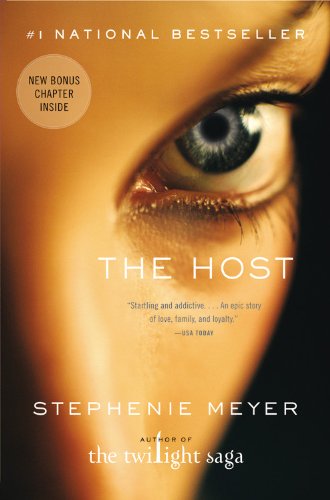
In Stephenie Meyer’s The Host, aliens have decided that humans are incapable of taking care of themselves or the planet, so they’ve invaded Earth. As worm-like souls, the aliens can only function when inserted inside a human, through an opening at the base of the skull. Usually, the human soul will disappear completely, leaving the worm soul to function alone—but this isn’t always the case.
Melanie Stryder gets caught while she’s out raiding for food. An alien soul, called Wanderer, is inserted into her brain, but Melanie refuses to go away quietly. In fact, she doesn’t go away at all, much to Wanderer’s irritation. Wanderer doesn’t want to feel what Melanie feels, but she soon falls in love with Jared (Melanie’s love, who’s still in hiding) and Jamie (Melanie’s brother, who’s also in hiding). She’s supposed to give seekers any information that she gets from Melanie’s memories that might lead them to other hiding humans, but the longer she interacts with Melanie, the less she wants to tell the seekers anything.
Defying the seekers, Wanderer sets out with Melanie, as her constant companion, to find Jared and Jamie—knowing that both the humans and the seekers could kill them on sight. Wanderer struggles with emotions she never intended to feel; her species is kind and practical—and human emotions are anything but. Humans are aggressive and angry creatures who resort to violence way too often to solve problems. But is that really all there is to a human? Can they also be loving and kind? Don’t they at least deserve to live? As Wanderer questions her situation, she begins to wonder if the aliens could be wrong in what they’re doing.
The Host is my kind of science fiction. Character-driven and filled with inner struggle, this novel made me think beyond the scope of reality. As I read, I struggled with the characters and their emotions. In fact, I became irritated with almost every character in the book at least once—often more than once. Someone was always too emotional, too practical, too stupid, or filled with too much hate and self-righteousness. But this isn’t necessarily a bad thing—because it brings out each character in a realistic way. Ms. Meyer also does a splendid job of showing both sides of the coin when it comes to aliens versus humans—and I even found myself agreeing with the aliens’ observations and points.
The Host also made me think about our planet and the actions of humans in general. Most of the time, we really are atrocious beings—but we do the best we can with the wide spectrum of emotions that we have to deal with. As you read The Host, you’ll ask yourself, as I did, what you would do in any of the situations. I must confess that I didn’t always choose the kind or practical way.
Give me an entertaining story that also makes me think outside the box, and I’m one happy reader—and Ms. Meyer has done both with The Host. If she keeps penning science fiction of this caliber, I’ll quickly become one of her biggest fans.


